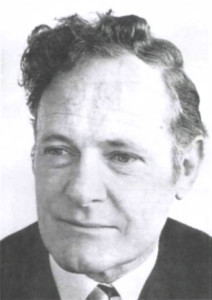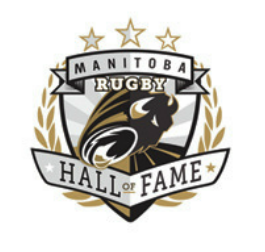
Although he spent less than a decade (1948 to 1956) in Manitoba, Dr. Robert W. Pringle (1920 – 1996) made significant contributions which served to support and build the game of rugby in Scotland, Manitoba and Monaco.
Born in Edinburgh, Scotland he attended George Heriot’s School and Edinburgh University. While in school he developed his passion for rugby, and was a talented hooker who played for a combined Edinburgh-Glasgow side against the 1947 Wallabies. While he never earned a cap, he played for the Rest-of-Scotland against Scotland, scoring a brilliant try.
Proclaimed as “An outstanding rugby player, he took part in the international finals in Scotland last season” by the Winnipeg Tribune (September 21, 1948) in an article about his appointment as an Associate Professor in the Department of Physics at the University of Manitoba, he rapidly progressed to become Department Head in 1953.
The “rugby-player-turned-physicist” (Winnipeg Tribune, November 3, 1949) co-invented a portable scintillometer for geophysical exploration – which formed the basis of his company Nuclear Enterprises (established with two colleagues from the University of Manitoba in 1950, prior to his return to Scotland) which eventually employed 800 employees around the world, ultimately becoming EMI Thorn (in 1979).
In 1967, in recognition of his distinguished service, Pringle was appointed by the Queen to the Order of the British Empire as an Ordinary Officer of the Civil Division.
In late 1953, the Manitoba British Rugby Union was reformed and he was elected to the Board. As one of his responsibilities, Pringle represented the union during 20-minute stopover on March 8, 1954 near the conclusion of a six month tour by the New Zealand All Blacks (Captained by Bob Stewart) who made City of Winnipeg Alderman Howard McKelvey an honourary member of the All-Blacks during their brief time in Winnipeg.
In April, 1954 the University of Manitoba Rugby Football Club was established and competed in a league comprised of teams from the North Atlantic Treaty Organization and the Royal Canadian Air Force, the Wanderers and the Maple Leaf United. At the inaugural election, Pringle was appointed to represent his club at the Union, ultimately serving as President of the Union.
After his retirement in 1976, he relocated to Monaco where he founded the Glenlivet Monte Carlo Sevens in 1987; “repeating what he had done in Manitoba where he had introduced the Canadians to Sevens also.” (The Royal Society of Edinburgh, 1996).
Robert William Pringle was thus an individual who made significant contributions to academia, industry, society and rugby.
Born in Edinburgh, Scotland he attended George Heriot’s School and Edinburgh University. While in school he developed his passion for rugby, and was a talented hooker who played for a combined Edinburgh-Glasgow side against the 1947 Wallabies. While he never earned a cap, he played for the Rest-of-Scotland against Scotland, scoring a brilliant try.
Proclaimed as “An outstanding rugby player, he took part in the international finals in Scotland last season” by the Winnipeg Tribune (September 21, 1948) in an article about his appointment as an Associate Professor in the Department of Physics at the University of Manitoba, he rapidly progressed to become Department Head in 1953.
The “rugby-player-turned-physicist” (Winnipeg Tribune, November 3, 1949) co-invented a portable scintillometer for geophysical exploration – which formed the basis of his company Nuclear Enterprises (established with two colleagues from the University of Manitoba in 1950, prior to his return to Scotland) which eventually employed 800 employees around the world, ultimately becoming EMI Thorn (in 1979).
In 1967, in recognition of his distinguished service, Pringle was appointed by the Queen to the Order of the British Empire as an Ordinary Officer of the Civil Division.
In late 1953, the Manitoba British Rugby Union was reformed and he was elected to the Board. As one of his responsibilities, Pringle represented the union during 20-minute stopover on March 8, 1954 near the conclusion of a six month tour by the New Zealand All Blacks (Captained by Bob Stewart) who made City of Winnipeg Alderman Howard McKelvey an honourary member of the All-Blacks during their brief time in Winnipeg.
In April, 1954 the University of Manitoba Rugby Football Club was established and competed in a league comprised of teams from the North Atlantic Treaty Organization and the Royal Canadian Air Force, the Wanderers and the Maple Leaf United. At the inaugural election, Pringle was appointed to represent his club at the Union, ultimately serving as President of the Union.
After his retirement in 1976, he relocated to Monaco where he founded the Glenlivet Monte Carlo Sevens in 1987; “repeating what he had done in Manitoba where he had introduced the Canadians to Sevens also.” (The Royal Society of Edinburgh, 1996).
Robert William Pringle was thus an individual who made significant contributions to academia, industry, society and rugby.
Passed 1996


